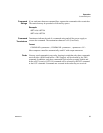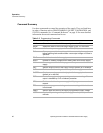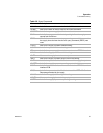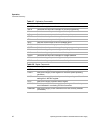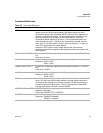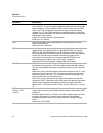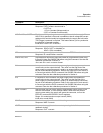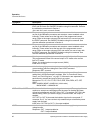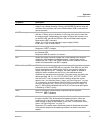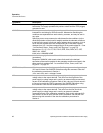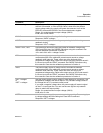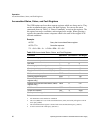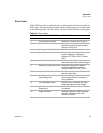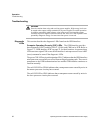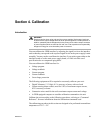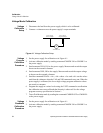
Operation
Command Reference
Release 3.1 47
Command Description
OVCAL Causes the master controller to perform automatic calibration of the
supply’s over voltage protection circuitry. Set CMODE ON before using this
command. Ensure jumper J65 on the GPIB Interface PCB is connected for
remote operation.
OVSET <voltage> Sets the supply’s over voltage protection trip point in volts (default) or in
millivolts. If the trip point is exceeded, or if the trip point value is lower than
the present output voltage setting, the supply will ignore the command, turn
on the ERR LED, and set the ERR bit in the accumulated status register.
Reset with the RST command.
Range: 0 to 110% of model maximum output voltage (VMAX)
Initial value: 110% of model VMAX
OVSET? Asks for the supply’s present over voltage protection limit.
Response: OVSET <voltage>
ROM? Asks for the version number of the master and slave EPROMs located on
the interface PCB.
Response: ROM M:<version> S:<version>
RST Resets the supply to present voltage and current settings if the output is
disabled by over voltage or foldback protection. Output values may be
changed via VSET, ISET, and OVSET while the unit is disabled, but those
values will not take effect until RST is applied.
SRQ <1/ON>,<0/OFF> SRQ ON enables the supply to respond to a variety of fault conditions with a
request for service to the IEEE-488 bus controller. With SRQ ON, the SRQ
line will be asserted true whenever the FAU bit in the supply's serial poll
register changes from 0 to 1. Therefore, the mask register, in addition to
specifying which conditions set the FAU bit, also determines which
conditions can generate service requests. Ten power supply conditions are
defined as faults: CB, CC, OV, OTP, SD, ERR, FOLD, ACF, OPF, SNSP.
Use the FAULT? query to discover which condition caused the service
request. See
“Accumulated Status, Status, and Fault Registers” on page
50
. A request for service at Power ON (PON SRQ) is set via a rear panel
switch on the supply. See
“Power On Service Request (PON SRQ)” on
page 25
. SRQ remains disabled until the FAULT bit in the serial poll register
is cleared by a FAULT? query.
SRQ? Asks for the supply's present ability to generate service requests.
Response: SRQ 0 (disabled)
SRQ 1 (enabled)
STS? Asks for the supply’s present status register. Status conditions are stored in
the status register. Each bit represents a separate condition. When the
condition is true, the corresponding bit is 1 (true). Bits remain set in the
status register as long as the condition is true. See
“Accumulated Status,
Status, and Fault Registers” on page 50
.
Response: STS <status mask> where status mask is the decimal equivalent
of the total bit weights for the operating conditions as listed in the status
register.



